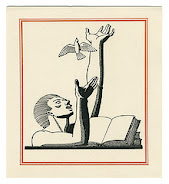Now--slight but personally important aside begins here--this isn't about being part of "the literary smart set." Rather, I think it's good practice for anyone who wants to talk shop about literature and the reading of it to engage with books from across, and sometimes off, their personal taste radars. Which, okay, maybe is about being part of the literary smart set. What I think I'm getting at is that I'm not comfortable with the sort of value judgment implied by a discussion of "the smart sets," in a sort of snoot-vs-snooty-antisnoot sense, or a hipper-than-thou-hipster sense. As if the "smart set" were a self-important, exclusionary organization, populated by nothing but smug bastards who scoff at those on the outside. I'm not so naive as to suggest it doesn't happen, consciously or not, but I'm also bold enough to suggest that people who are like that ought to be bopped on the nose, because thinking that way is a bunch of horsepucky. Reading literature and talking about it is as inclusive an activity as I can think of, asking of those who wish to take part in it only that they do it as much as they like, to whatever extent or end they like. I like to think (hope) that the "literary smart set"--and yes, you can read "litbloggers" there if you want--is by and large an encouraging group; that the discussion, debate, and disagreements are friendly in nature; and that I'm contributing to that in my own way. At least, I hope my professed love of and enthusiasm for big hard books--as well as for all books I like--is as evidently well-intentioned (an entertaining) as I desire it to be.(Emphasis mine.) I've said it before and I'll say it again: a lack of willingness to submit oneself to "difficulty" can be just as snobbish as the attitude of ivory-tower types who look down on "the masses." We are the ones who deny ourselves opportunities to grow beyond our personal boundaries.
In any case--literary or not--I do think it's healthy to stretch beyond yourself from time to time. In a literary sense, a book like Gravity's Rainbow becomes a portable education in close reading, forcing you--if you accept the challenge--into a deeper headspace that both shifts and intensifies your relationship with the words on the page.
As Flannery O'Connor said,
Art never responds to the wish to make it democratic; it is not for everybody; it is only for those who are willing to undergo the effort needed to understand it. We hear a great deal about humility being required to lower oneself, but it requires an equal humility and a real love of the truth to raise oneself and by hard labor to acquire higher standards.


